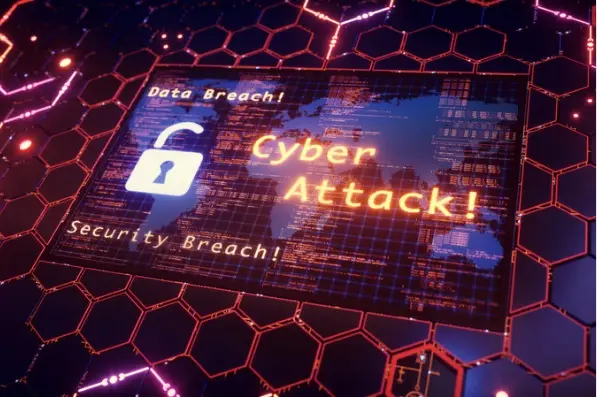The CDK Cyber Attack: A Comprehensive Look at the Automotive Industry’s Digital Nightmare

The CDK Cyber Attack caused many problems for car dealerships, car makers, and customers. Hackers broke into the systems of CDK Global, a primary software provider for car dealerships. This caused a lot of trouble, like stopping car sales, slowing down repairs, and making people worried about their private information. Let’s learn how this happened and what it means for everyone.
What Happened During the Attack?
On June 18, 2024, a group of cybercriminals, the BlackSuit ransomware gang, hacked into CDK Global’s computer systems. This group is believed to be connected to other dangerous hacker groups in Eastern Europe and Russia.
The attackers used a kind of software called ransomware, which locked up essential files and systems. This forced CDK Global to shut down all their computer systems, including phones and other software. Just a day later, on June 19, a second attack hit, making it even harder for CDK to recover.
Because of the attack, about 15,000 car dealerships in North America couldn’t access the software they needed for daily operations. This software helps them manage car parts and sell cars, schedule service appointments, and handle payroll. Many dealerships used manual, paper-based methods without it, significantly slowing their work.
How Did This Affect Everyone?
The attack had a significant impact on several groups:
Car Dealerships
With their systems down, car dealerships needed help keeping things running smoothly. They needed help managing their inventory, tracking sales, or handling other essential tasks like they usually do. This led to prolonged service and long delays in selling cars.
Some customers got frustrated because they had to wait so long. In some cases, the problem was so bad that employees had to be sent home because they had no work. The dealerships couldn’t even order new cars or check on cars that needed repairs without their computer systems.
Car Makers
Big car companies, such as BMW, Nissan, and Honda, were also affected by the disruption. These companies rely heavily on their dealership networks to track how many cars have been sold and how much inventory is still available. When the dealerships couldn’t provide this information, the car makers needed help planning their production schedules.
They needed to determine how many new cars they should build or send out. This problem can cause confusion and delays in getting new cars to customers, especially if factories make too many or too few cars.
Customers
People who wanted to buy cars or get serviced also faced many problems. Many experienced long delays and couldn’t get their cars as quickly as they wanted. Some customers could not complete their car purchases because the dealership’s systems were down, and they needed help to process payments or finalize paperwork.
This caused frustration and disappointment. There were also concerns about the safety of their personal and financial information. People worried that their private data might be at risk because the systems that protect this information weren’t working correctly.
Financial Loss
The economic impact of the systems being down was huge for everyone involved. It was about more than just the inconvenience; the car dealerships lost much money. The total loss for car dealerships alone was estimated to be over $1 billion.
This situation shows how much businesses depend on digital systems to operate smoothly. When these systems are disrupted, it can be very costly. It’s a reminder of how important it is to have robust and reliable technology in place. Even one small problem can lead to a significant financial loss and many headaches for everyone involved.
How Did the Hackers Do It?
While we don’t know all the details about how the attack happened, there are a few standard methods cybercriminals use:
Phishing Emails
Phishing emails are fake messages that look like they come from actual companies or people. They trick employees into doing things they shouldn’t, like giving away their passwords or clicking on the wrong links. These links can take them to fake websites that steal their personal information.
Phishing emails might say there’s a problem with their account or offer something exciting like gifts. Employees must be conscientious about opening emails from unknown people. They should double-check the email address and only click on links or open attachments if they are sure it’s safe. Always think before you click!
Social Engineering
Social engineering is a sneaky way hackers get people to give away important information. They pretend to be trustworthy, like a boss, co-worker, or a friend, to trick people into sharing passwords, bank details, or other private information. Hackers might call, email, or even meet people face-to-face to gain their trust.
For example, they could pretend to be from tech support and ask for access to a computer. It’s essential for employees always to verify who they are talking to and only share sensitive information if they are 100% sure the person is who they say they are.
Software Weaknesses
Software weaknesses are like tiny holes in companies’ programs. Hackers search for these holes to sneak in and cause trouble. If a program isn’t updated regularly, it might have these weaknesses, making it easier for hackers to break in and steal information. That’s why it’s so important to keep software up-to-date.
Updating software fixes these weaknesses and keeps hackers out. Employees should always make sure their computer programs are using the latest versions. If they see a message asking to update software, they should do it immediately to help protect against any threats.
Who Are the BlackSuit Ransomware Gang?
The BlackSuit ransomware gang first appeared in April 2023. Although they are a relatively new group, they have already made a name for themselves by targeting high-profile organizations. This group doesn’t just lock up files; it also threatens to release stolen data if its ransom demands aren’t met. In CDK Global’s case, the hackers initially asked for $10 million but quickly raised their demand to over $50 million as negotiations continued.
Key Events in the Attack
Here’s a timeline of what happened during the CDK Cyber Attack:
June 18, 2024: The First Ransomware Attack
On June 18, 2024, CDK Global, a company that manages essential data for businesses, faced a big problem. A ransomware attack happened, so hackers locked up all of CDK Global’s important files. They did this to demand money in exchange for unlocking the files.
This was a significant issue because CDK Global’s files are crucial for operations. Imagine someone taking your favorite toy and only giving it back if you pay them. That’s what happened to CDK Global, except instead of a toy, it was important business files.
June 19, 2024: Shutting Down IT Systems
The very next day, on June 19, 2024, CDK Global made a tough decision. They decided to turn off all their computer systems to try and stop the hackers from causing more damage. Unfortunately, a second attack happened while they tried to fix the first one.
This made it even harder for them to get everything back to normal. It’s like if you’re trying to clean up a big mess, and someone keeps making it worse, making your job much harder.
June 22, 2024: Restoring Systems and Paying Ransom
By June 22, 2024, CDK Global began getting their systems back in order. They started working on restoring everything to how it was before the attacks. They were also thinking about paying the hackers a lot of money to get their files back. This is similar to buying back something you lost or had taken from you. They wanted to ensure their business could continue running smoothly and their data safe.
July 4, 2024: Services Restored
On July 4, 2024, CDK Global finally had some good news. They announced that their services were back up and running. This means their computer systems and online services were working again, and car dealerships that use their services were back online, too. It’s like fixing something that was broken and finally using it again. CDK Global had managed to get everything back to normal after the tough days of dealing with the attacks.
Recovering from the Attack
Recovering from the attack was challenging for CDK Global. They had to decide whether to pay the ransom, which is always a tough choice because paying could encourage more attacks in the future. Instead, they focused on restoring their systems step-by-step, starting with the most important ones. Despite their efforts, the downtime caused significant problems for car dealerships, who had to catch up on weeks of delayed work.
What Does This Mean for Cybersecurity?
The CDK Global attack clearly warns about the automotive industry’s digital systems risks. Here are some key takeaways:
Weak Links in the Chain
If one company in a supply chain is attacked, it can impact the entire industry. This happens because many companies rely on each other to do business. For example, if a company that supplies parts to car makers is hacked, the car makers might also be affected.
This shows why it’s so important for all companies in a chain to have robust cybersecurity, not just individual ones. Every link in the chain must be secure to protect the whole industry from attacks. Companies need to work together and share information to keep everyone safe.
Advanced Cyber Threats
The double attack strategy used by BlackSuit shows that cybercriminals are becoming more clever and dangerous. Cybercriminals are now using more complex methods to break into systems. They might use two different attacks in one go to trick security systems.
This means companies have to be ready with robust and layered cybersecurity defenses. This means using multiple levels of protection to defend against these intelligent attackers. It’s like having several locks on a door to keep burglars out. Companies must keep updating their security to avoid these evolving threats.
Dependence on Digital Systems
The attack showed just how much the automotive industry relies on digital systems. Car makers use computers and software to design cars and manage production. When these digital systems are attacked or broken, it can cause big problems. It’s like if your computer stopped working and you couldn’t finish your homework.
For car makers, this means delays and halts in production. Companies need to ensure their digital systems are secure and have backup plans in case of an attack. This way, they can keep running smoothly even if something goes wrong.
Protecting Data
With so much customer and business data at risk, it’s crucial to protect it well. This means using solid measures to keep data safe from hackers. One way to do this is by using encryption, which turns data into a code only authorized people can read. Another way is limiting who can access sensitive information to only those who need it.
Regularly updating security measures is also essential to fix any weak spots. Think of it as locking your door and changing it regularly to keep intruders out. Strong data protection helps keep information safe from being stolen or misused.
Lessons Learned and How to Stay Safe
Have Backup Plans
Businesses should always have backup plans if their computer systems stop working. If their central systems fail, they should be able to do things by hand or with other tools. For example, if a company’s website crashes, it should have a manual way to process orders and handle customer service. This helps them keep working even if their digital tools are down. It’s like having extra keys for your house just in case you lose the main ones.
Improve Incident Response
When a business faces a cyber attack, it’s important to react quickly to minimize damage. This means having a team ready to handle problems as they happen. Regular practice and training can help staff know what to do during an attack. For instance, they might have drills where they practice what to do if hackers try to break in. This preparation helps them respond faster and better when a real problem occurs.
Protect Your Data
Data safety is very important. This involves using solid methods to keep information secure, like encryption, which is a way of coding data so only authorized people can read it. Businesses should also regularly check their security systems to ensure they work correctly. For example, they might use special software to scan for problems or weaknesses in their data protection methods.
Be Ready for Ransomware
Ransomware is an attack where hackers lock your files and demand money to unlock them. To protect against this, businesses should regularly back up their data. This means keeping extra copies of important information so they can restore it if needed.
Keeping networks separate and using advanced security systems can also help. For example, having separate systems for sensitive data can prevent all your files from being affected if one system is attacked.
Communicate Clearly
During a crisis, keeping everyone informed is crucial. This means having a clear plan for how to talk to employees, customers, and other important people. For instance, if there’s a data breach, businesses should have a strategy for quickly updating everyone about what happened and what steps are being taken. This helps prevent confusion and keeps everyone on the same page.
Train Employees
Teaching employees about cybersecurity is essential. Regular training can help them recognize and avoid scams like phishing, where hackers try to trick people into giving up personal information. For example, employees might learn how to spot fake emails that look like they’re from a trusted source but are attempting to steal information. This training helps protect the business from attacks.
Regular Security Checks
Businesses should frequently check their security systems to find and fix problems before hackers can exploit them. This involves doing regular reviews and tests to ensure everything works properly. For example, they might use special tools to scan for vulnerabilities in their software or hardware. Finding and fixing these weaknesses early can prevent more significant issues later on.
Use Strong Authentication
Strong authentication methods, like multi-factor authentication, add extra layers of security. This means that, besides a password, users might need to provide a code sent to their phone or use a particular app. This makes it much harder for unauthorized people to get access to systems. For instance, even if someone guesses your password, they still need the extra code.
Keep Systems Updated
It’s important to regularly update software and systems to protect against known security problems. Updates and patches are fixes that address vulnerabilities discovered in the software. For example, when a new security issue is found, the software company releases an update to fix it. Installing these updates helps keep systems secure from potential threats.
Consider Cyber Insurance
Cyber insurance can help cover costs if a cyber attack happens. It can provide financial support and help businesses deal with the aftermath of an attack. However, it’s not a substitute for reasonable security measures. For instance, if a company’s data is stolen, cyber insurance might help pay for some expenses, but strong security practices are still essential.
Looking Forward
The CDK Cyber Attack has prompted the automotive industry to rethink its approach to cybersecurity. There is now more discussion about the need for industry-wide cybersecurity standards and better collaboration between companies to share information about threats and best practices.
Some experts suggest that while cloud services are helpful, having some essential functions available locally might be a good backup in case of a significant outage. There’s also talk about increasing regulation to ensure companies handling consumer data have strong cybersecurity measures.
Conclusion
The CDK Cyber Attack of 2024 reminds us how vulnerable digital systems can be and the widespread impact a single cyberattack can have. It shows that cybersecurity needs to be a top priority for every business, not just an afterthought.
As we move forward, businesses in the automotive industry and beyond will need to balance the benefits of digital technology with the need for strong cybersecurity measures. This incident also highlights the importance of being prepared, staying vigilant, and building resilience against digital threats. If you also want to read about Chiso.Xyz then visit that post.
FAQs
What happened in the CDK Cyber Attack?
CDK Global, a primary software provider for car dealerships, was hit by a ransomware attack in June 2024. The attack locked their systems, forcing them to shut down and affecting thousands of car dealerships across North America.
How long did the outage last?
The initial attack happened on June 18, 2024, and services were fully restored by July 4, 2024, making the outage last about two weeks.
Who was behind the attack?
The BlackSuit ransomware gang, a cybercriminal group believed to have ties to Eastern Europe and Russia, was responsible for the attack.
What was the ransom demand?
The initial ransom demand was $10 million but increased to over $50 million as negotiations continued.
How did the attack affect car dealerships?
The attack disrupted nearly all aspects of dealership operations, including inventory management, sales, financing, service scheduling, and payroll processing. Many dealerships had to use manual processes during the outage.
Was customer data compromised?
It’s unclear if customer data was compromised, but the attack raised significant concerns about the security of personal and financial information stored in dealership systems.
What can other businesses learn from this incident?
Key lessons include the importance of having backup plans, strong response capabilities, prioritizing data protection, enhancing ransomware protection, and having clear communication strategies during crises.
How can businesses protect themselves from similar attacks?
Protective measures include regular system updates, employee training, multi-factor authentication, regular security assessments, and considering cyber insurance.
Will this attack change the automotive industry?
Yes, the attack will likely lead to increased focus on cybersecurity, potential regulation, and a push for more robust industry-wide standards and collaboration on cybersecurity issues.
Are there any new trends in cybersecurity as a result of this attack?
The attack may encourage businesses to diversify their technology infrastructure, increase local backups, and improve company coordination to respond to emerging threats quickly.





